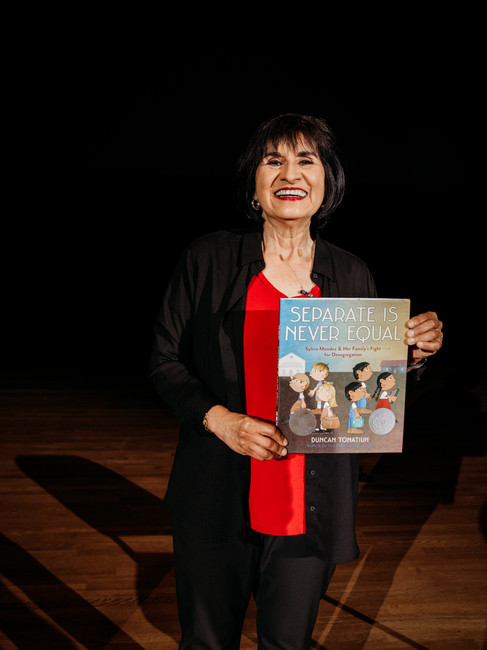It's ear-ma, not ur-ma
- Irma Herrera

- Sep 13, 2024
- 4 min read
Updated: Apr 11, 2025
I am performing the latest version of my solo show, Why Would I Mispronounce My Own Name?, on Saturday, September 28, 2024, at 7:30 pm and Sunday, October 6, at 2:00 pm at Central Stage in Richmond, California. These are the only San Francisco Bay Area shows I'll have in 2024. Click here to learn how I pronounce my name (in case you don't know). Ear-ma is close enough.
My show explores the relationship between identity, names, and our assumptions about people different from us. I promise you an evening filled with laughter and reflection, and you'll leave knowing a tad bit more about American history. In the post-show talkback, you will also be able to share your own experiences about these themes.

A Personal Exploration of Identity and Culture
I play 20+ characters in this solo show — my parents, teachers, classmates, colleagues, and me at various ages. As I share these stories, I tackle the ever-persistent question that those of us considered not real Americans often face: “No, but where are you really from?”
As someone with deep multi-generational family roots in South Texas, I take pride in the rich cultural heritage of Mexican Americans. And I have first-hand experience with the prejudice and discrimination that has been directed towards my community, not just in Texas but throughout the Southwestern United States. Knowing more about the fraught history of US-Mexico relations over the past two centuries allows us to put the current scapegoating of Mexicans and other Latinos into perspective. Many folks are not aware that the entire Southwestern part of what is now the United States was Mexico until 1848, the year before the Gold Rush. You've heard the expression, we didn't cross the border; the border crossed us.

Mexicans became part of the United States through empire-building, and Mejicanos, whether born on this side of the border (or el otro lado), have historically been treated like colonized people. Efforts to strip us of our native language and culture were still commonplace in my youth. However, the porous 2000-mile border between the two countries and the abundance of binational families kept our language and culture alive. For decades, children were forced into segregated, inferior schools, and adults were denied the right to vote, the right to serve on juries, and be tried by a jury of their peers. State-sanctioned brutality of Mexican-Americans at the hands of the police, Texas Rangers, and other state officials was common.
Developing My Play
Classes at the Berkeley Marsh Theater with David Ford sparked my entry into oral storytelling. Then, I was fortunate enough to participate in a seven-day workshop with Anna Deavere Smith and her creative team, including dialect designer Amy Stoller, with whom I've stayed in touch over the past decade. Working with these folks fueled my confidence and creativity, allowing me to shape this personal story with the universal themes of othering and belonging.
You might ask what othering and belonging are. When we feel excluded, marginalized, and treated as if we don't belong in a particular setting, we feel "othered." By contrast, when we feel included, welcomed, and respected, we experience a sense of belonging. These are universal experiences, and we have all been in both situations.
There is ample social science research about the social dimensions of othering and belonging, and an institute at UC Berkeley is devoted to research and training on this topic. Click here to visit the Othering and Belonging Institute.
I regularly update Why Would I Mispronounce My Own Name? to weave in current events and help us connect the dots about how bias and prejudice demean us all. We all need to be reminded that having been at the receiving end of bigotry and mistreatment does not insulate us against mistreating other people. You will see new material in these two shows even if you've been to previous performances.
My Wonderful Support Team
I am grateful to have the support of David Ford, with whom I developed this work, and Rebecca Fisher, who has directed my play for the past several years. I am working on a new play, Class Migrant, and David and Rebecca are part of that process. I also sincerely appreciate the No Name Creatives group, which meets regularly to share our work—a handful of women storytellers with much to say. The support of my spouse, our son, and my friends is invaluable.
Engaging Beyond the Performance
I love the community engagement that follows each show, where audience members share their experiences with prejudice and bias related to names and beyond. I learn so much in these conversations, and some of your stories (with your permission) end up in later versions of my show and in newsletters I write.

I Hope You Can Join Me!
This performance is not just about my experiences navigating prejudice based on ethnicity, skin color, gender, and socio-economic class; it’s about creating a space to connect, learn from each other, and celebrate our diverse backgrounds and cultures. It's also an opportunity to showcase our resilience and explore how we use our education, access, and all forms of social capital to pay it forward and advance justice for all.
I hope to see you in the audience and hear your thoughts after the shows!

I'll perform at Central Stage at 5221 Central Avenue, Richmond, CA. Saturday, September 28 · 7:30 - 9pm PDT Sunday, October 6 · 2 - 3:30pm PDT
General admission: $28.52 incl. $3.52 Fee Student discount: $17.85 incl. $2.85 Fee








Comments